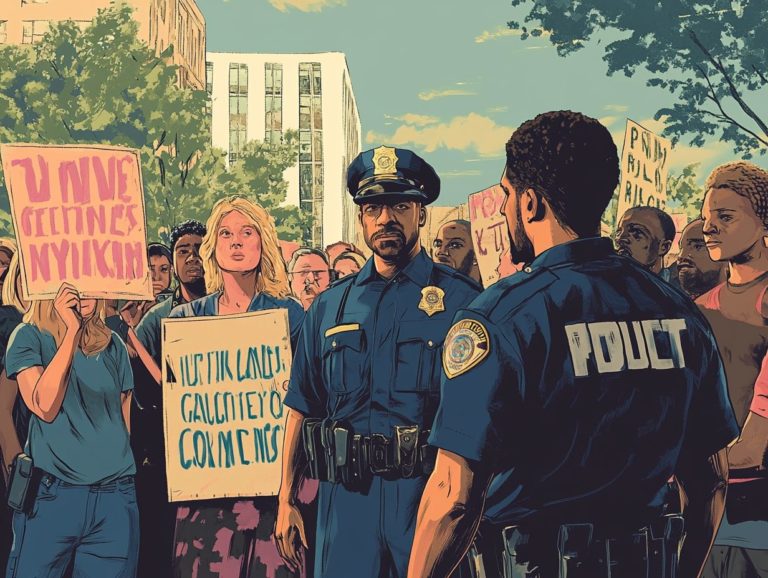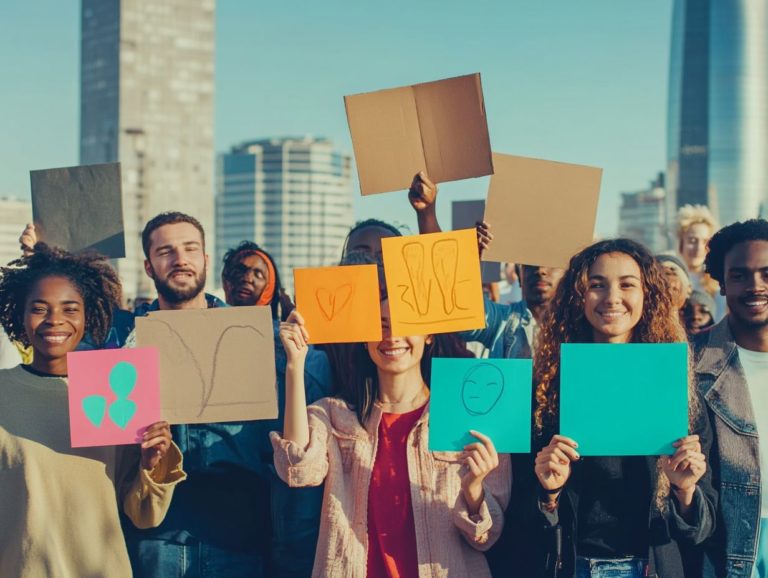5 Ways to Advocate for Your Rights
Advocating for your rights is crucial in building a fair society.
Whether you re educating yourself about the laws that protect you, sharing your personal experiences, or collaborating with organizations committed to social justice, every action you take makes a difference.
This piece explores five effective strategies to empower you on your advocacy journey. It addresses common barriers you may encounter, offers insights on how to overcome them, and provides resources to help you deepen your understanding of your rights.
Jump in and discover how you can make a real impact today!
Contents
Key Takeaways:
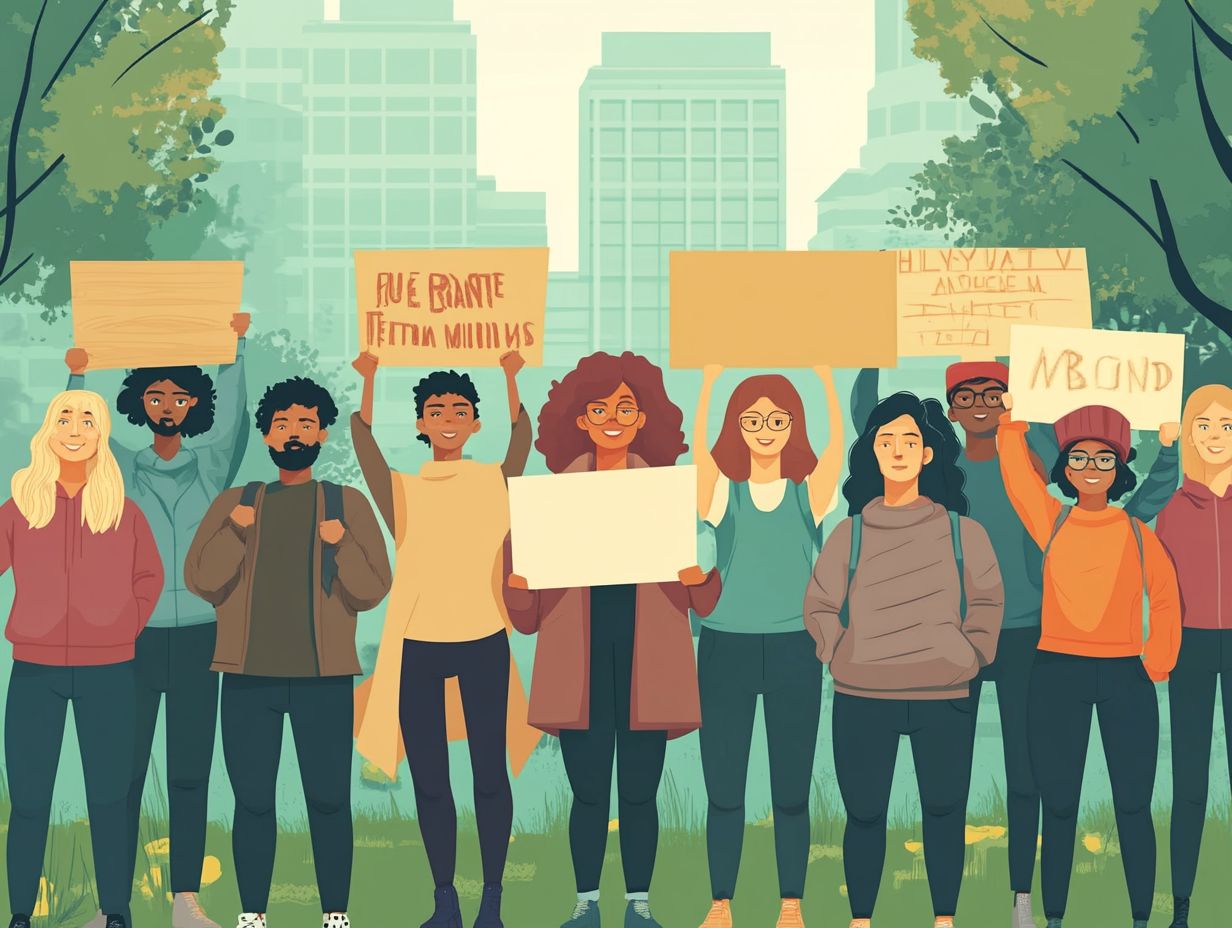
Know your rights and educate yourself on how to protect them. Don’t be afraid to speak up and share your personal experiences to raise awareness. Support organizations that fight for your rights and join their efforts if possible.
1. Educate Yourself on Your Rights
Educating yourself about your rights is the cornerstone of effective advocacy. This empowerment enables you to understand legal and healthcare systems while fully grasping your fundamental entitlements and the support available through various organizations and community resources.
This knowledge doesn t just bolster your confidence; it fosters a deeper sense of community by ensuring you are aware of your healthcare, legal, and community rights.
By understanding these multifaceted rights, you can better represent yourself and others who may be in need.
Numerous resources, such as Non-Governmental Organizations (NGOs) dedicated to empowerment, educational programs tailored to specific rights, and online petitions that aim to raise awareness, play crucial roles in enhancing this understanding.
These tools equip you with invaluable information and help create a supportive network that amplifies voices and facilitates change, transforming advocacy into a collaborative effort rather than a solitary journey.
Speaking up and sharing your experiences is not just important; it’s a powerful form of self-advocacy. It can spark awareness, inspire change, and motivate others to engage in advocacy, especially through social media platforms that amplify voices and foster community support.
In today s interconnected world, your personal narrative can resonate profoundly, allowing you to illustrate the impact of systemic issues in a relatable way.
These stories not only humanize the struggles tied to various causes but also illuminate injustices that often remain in the shadows.
When you share your journey, you invite others into your experiences, promoting empathy and understanding while dismantling the barriers of silence.
The expansive reach of social media becomes an invaluable tool, enabling you to connect with diverse audiences and mobilize collective movements.
Through these shared narratives, your call for change evolves from a solitary effort into a dynamic, community-driven campaign that resonates on a much larger scale.
3. Join or Support Organizations Fighting for Your Rights
Joining or supporting organizations dedicated to advocating for your rights not only amplifies your voice but also enhances community advocacy.
These groups offer essential resources and expertise to help you navigate complex social justice issues and systemic barriers faced by various minorities and marginalized communities.
Among these pivotal organizations, NGOs like Amnesty International and Human Rights Watch are at the forefront of promoting human rights globally.
They conduct thorough research, advocate for policy changes, and mobilize public opinion to confront injustices head-on.
You can support these important causes in several impactful ways. Here are some ways you can support these organizations:
- Volunteering your time to assist with campaigns
- Participating in awareness programs
- Making financial contributions that directly fund crucial advocacy efforts
Every small action you take contributes to a larger movement, creating a ripple effect that fosters societal change and empowers those in need.
4. Use Your Voice and Vote
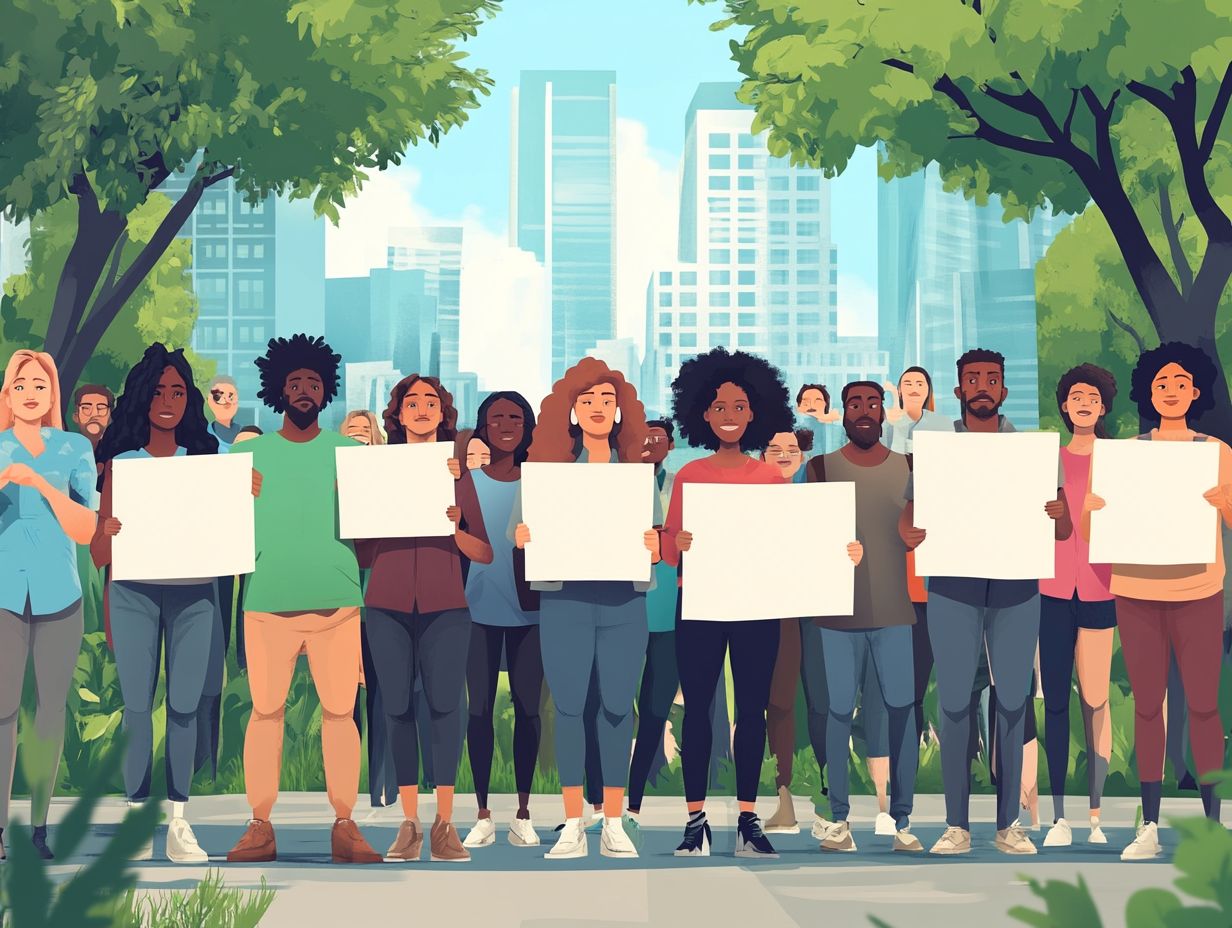
Using your voice and exercising your right to vote are important ways to advocate politically. These actions empower you to influence policies and support candidates who resonate with your values. Ultimately, this uplifts communities and ensures their rights and interests are represented.
When you engage in the electoral process, you impact local and national elections. You also foster a culture of civic responsibility that drives meaningful change. An informed electorate is essential, as it seeks to grasp the implications of current issues, allowing you to connect deeply with local political movements and initiatives.
By championing causes that matter to your community, you can enhance awareness and mobilize support for campaigns that align with shared goals. This approach cultivates a grassroots advocacy network that holds elected officials accountable, ensuring that your collective voice is heard and valued.
5. Hold Those in Power Accountable
Holding those in power accountable is essential to your advocacy efforts. It ensures that government officials and organizations keep their promises and adhere to ethical practices. This fosters transparency and justice in meeting community needs and upholding rights.
By leveraging specific methods of accountability, you can mobilize communities to actively engage in the democratic process.
For example, letter-writing campaigns enable you to voice your concerns directly to decision-makers, creating tangible pressure for change. Petitions serve as another effective tool, showcasing collective concern and urging officials to take action.
In-person actions, such as protests and town hall meetings, facilitate direct dialogue between you and your representatives. This instills a sense of urgency around critical issues.
Campaigns like the successful push for climate policy reform show how grassroots mobilization and sustained engagement can yield meaningful accountability. They showcase the remarkable power of collective voices in driving change.
Why Is It Important to Advocate for Your Rights?
Standing up for your rights is a powerful step toward real change in society. By doing so, you help combat discrimination and address systemic issues affecting marginalized communities. This promotes social justice and equitable representation.
When you and your community unite, you can challenge unfair laws and policies. Just think about the impact of pivotal movements like the Civil Rights Movement in the United States it led to groundbreaking legislation such as the Civil Rights Act and the Voting Rights Act, fundamentally altering the landscape of equality.
Similarly, contemporary movements like Black Lives Matter have sparked global awareness around systemic racism, leading to significant policy reforms at both local and national levels.
Every action you take whether participating in a march, reaching out to your representatives, or sharing crucial information on social media plays a vital role in reshaping community rights. Together, you can nurture a culture where justice is not just an ideal but a priority.
What Are Some Common Barriers to Advocating for Your Rights?
Common barriers to advocating for your rights often include systemic discrimination, biases within legal systems, and a lack of engagement or understanding of the advocacy process. These factors can hinder your ability to effectively voice your needs and interests.
If you belong to a marginalized group, such as a racial or ethnic minority, you may encounter additional challenges like language barriers, unequal access to resources, and cultural stigmas, complicating your participation in advocacy efforts.
Understanding these challenges means listening to your community and evaluating their needs. By fostering inclusive educational initiatives and amplifying community support networks, you can help systematically address these barriers.
Training programs aimed at nurturing leadership among individuals in vulnerable situations empower you to understand your rights and rally support, creating a more equitable environment for everyone involved.
How Can You Overcome These Barriers?
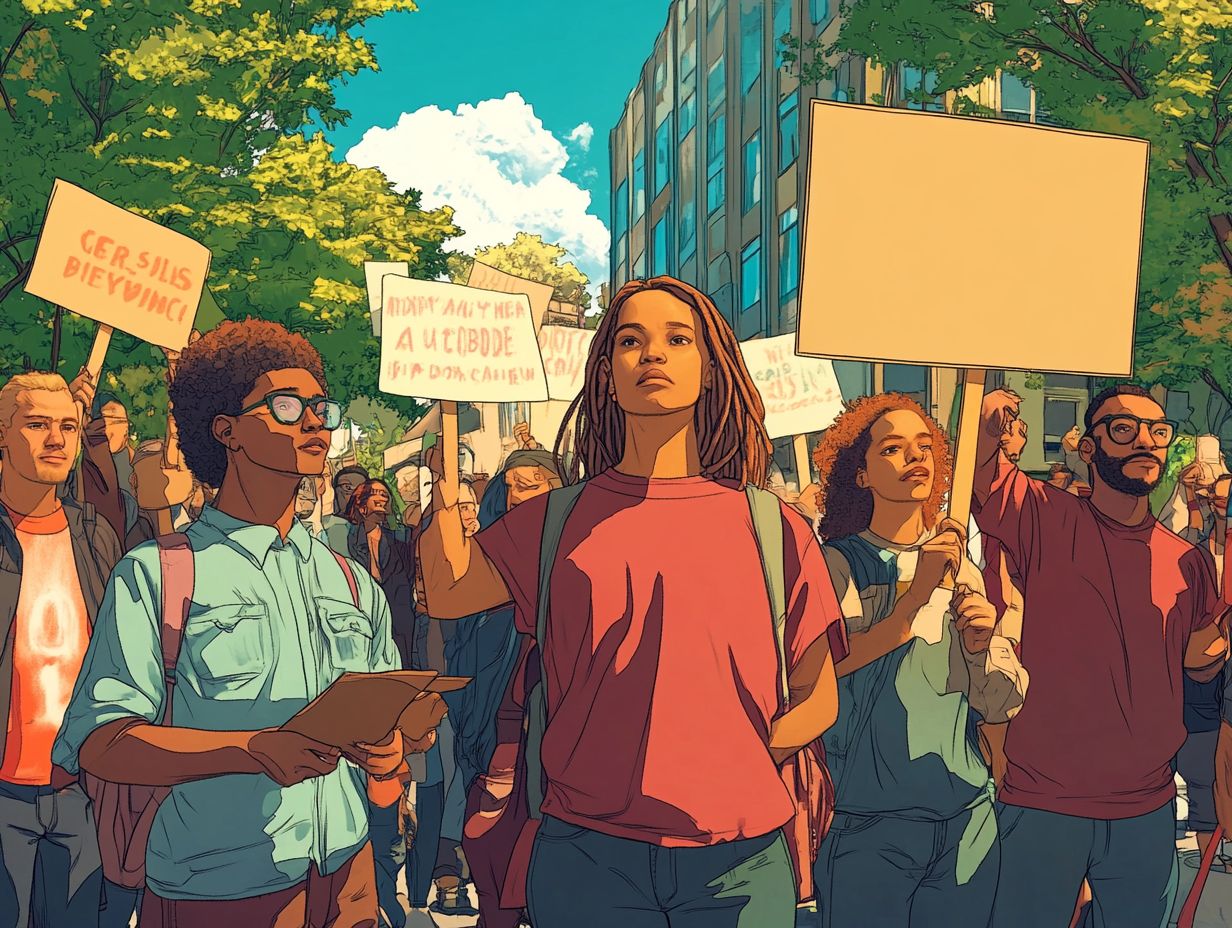
Overcoming barriers to advocacy requires a multifaceted approach. This includes education, community support, and empowering individuals to embrace diverse methods.
Building resilience and determination is crucial in confronting systemic challenges. You can achieve this by establishing mentorship programs that connect you with seasoned advocates who can offer invaluable guidance and insights.
Participating in workshops sharpens your skills and boosts your confidence in communicating your ideas effectively. Collaborating with advocacy organizations amplifies your efforts, pooling resources and expanding your networks.
Ultimately, equipping community members with the necessary tools and cultivating a supportive environment strengthens the capacity to challenge injustices, reinforcing a united front in your advocacy endeavors.
What Are Some Effective Ways to Advocate for Your Rights?
Effective advocacy for your rights involves employing a range of methods, including letter-writing campaigns, petitions, and engaging in in-person actions to elevate awareness and cultivate community support for systemic issues.
Utilizing these approaches significantly enhances the visibility and impact of your cause. For instance, letter-writing campaigns encourage lawmakers to reconsider laws regarding environmental protection, illustrating how individual voices can collectively create substantial influence.
Petitions can also be powerful; gathering numerous signatures compels organizations to respond meaningfully to public demand. In-person actions, such as rallies or town hall meetings, provide opportunities to connect directly with stakeholders, fostering a palpable sense of community and urgency around specific issues.
Planning and working together in advocacy efforts are essential. They ensure that your initiatives are well-coordinated and resonate effectively with your target audience, ultimately creating a unified front for change.
How Can You Encourage Others to Advocate for Their Rights?
Encouraging others to advocate for their rights involves building a supportive community that empowers and educates. This environment allows you to feel confident in voicing your experiences and needs while employing effective advocacy methods.
One impactful strategy is to host workshops that equip participants with practical skills so they can fully grasp their rights and learn how to communicate them with clarity and confidence.
Share valuable resources such as articles, guides, and personal testimonies to significantly enhance knowledge and awareness within the community. Leverage social media platforms as powerful tools to amplify voices and experiences, connecting individuals facing similar challenges while reaching a wider audience.
By combining these strategies, advocates can foster a robust network of informed individuals ready to take action.
What Are Some Resources for Learning More About Your Rights?
A wealth of resources awaits you as you seek to deepen your understanding of your rights. Consider the following:
- Educational programs from NGOs
- Online databases on legal rights
- Workshops at local libraries
- Seminars at community centers
Local libraries may host enlightening workshops and provide essential books on self-advocacy and legal literacy. Community centers often partner with passionate activists to present seminars designed to empower individuals like you. Social media platforms further enhance your journey, serving as dynamic venues for real-time discussions and the sharing of personal advocacy experiences.
To fully harness these resources, engage actively. Participate in workshops, ask insightful questions, and connect with others who share your aspirations; doing so will help you cultivate a supportive network.
By leveraging online resources effectively, you can stay informed about pressing issues and mobilize collective action when the moment calls for it.
Frequently Asked Questions
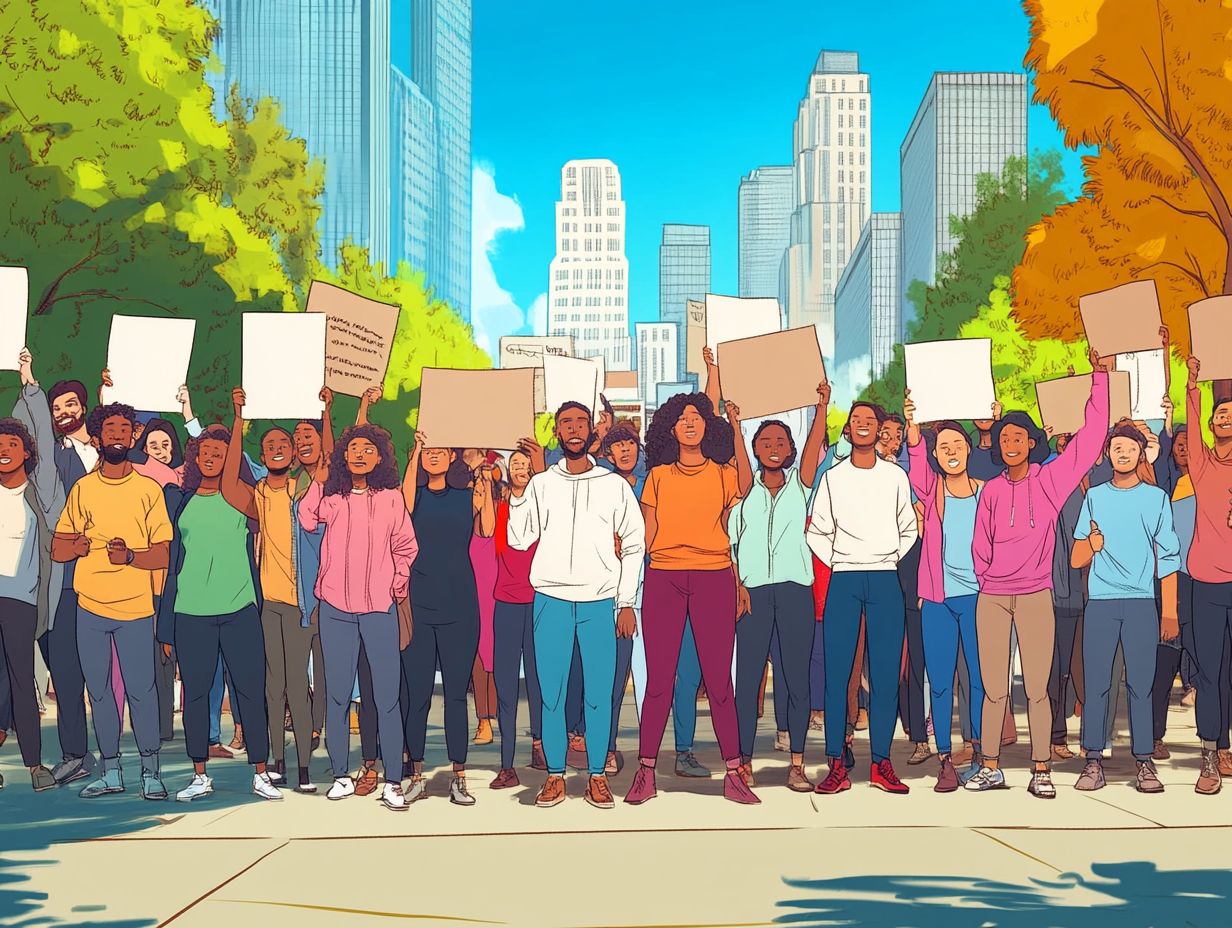
What are five ways to advocate for your rights?
Here are five effective strategies:
- Educate yourself about your rights.
- Speak up and stand your ground.
- Collaborate with others.
- Use legal help.
- Stay persistent and resilient.
Why is it important to advocate for your rights?
Advocating for your rights protects you and others from injustice and discrimination.
It helps create positive change and promotes fairness in society.
How does educating yourself about your rights help?
Knowing your rights makes you aware of laws that affect you.
This knowledge helps you communicate and defend those rights effectively.
How can you collaborate with others in your advocacy?
Join or form groups that support your cause.
Attend rallies and network with like-minded people to amplify your voice.
What legal resources can aid in your advocacy?
Lawyers, legal aid clinics, and advocacy groups provide support and guidance.
They can help you navigate the legal system and fight for justice.
Why is persistence important in advocacy?
Advocating for your rights can be challenging.
Staying committed helps you overcome obstacles and make a real impact.




